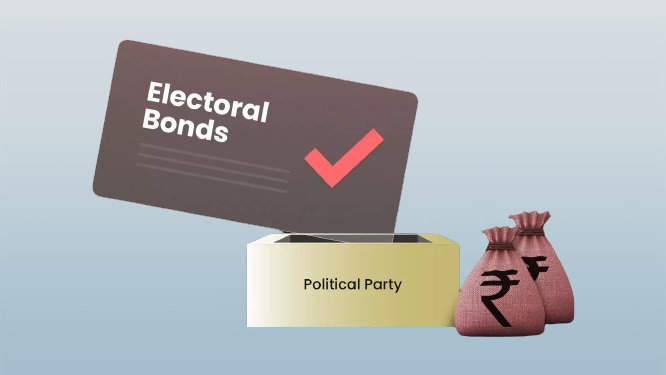Introduction:
- Civil society has been campaigning for long to empower the voter by improving her access to background information on the candidates in the electoral fray, and to bring about greater transparency in the obscure domain of political funding.
- In this, the instrument of public interest litigation (PIL) has been deployed to good effect. The campaign is premised on the citizen’s democratic right to information (RTI), which is integral to the fundamental right to speech and expression under the Constitution.
A veil over the corporate donor:
- Electoral Bond Scheme (EBS) was touted as a sincere effort to clean up electoral democracy by incentivising political donations through banking channels.
- To begin with, the Foreign Contribution (Regulation) Act (FCRA) was retrospectively amended through the Finance Act of 2016 to permit Indian subsidiaries of foreign companies to donate to political parties. This was followed by an overhaul of the regulatory framework comprising the Representation of the People Act (RPA), the Companies Act, 2013, the Income Tax (IT) Act and the RBI Act through the Finance Act of 2017, despite strident protests from the RBI, the Election Commission of India (ECI) and Opposition parties.
- The device of incorporating the amending Bills in the Finance Bill effectively short circuited the consideration of the legislative proposals by the Rajya Sabha and ensured their smooth passage.
- Months before the EBS was promulgated, the Association for Democratic Reforms (ADR) and Common Cause filed a PIL to challenge the constitutionality of the amendments made in the Finance Act of 2017. The petition contended that these amendments infringed the citizen’s fundamental ‘Right to know’ under Article 19(1)(a), and were not saved by any of the permissible restrictions under Article 19(2).
- The petition held that the impugned amendments jeopardised the country’s autonomy, militated against transparency, incentivised corrupt practices by lifting the caps on corporate donations and allowing contributions by loss making and shell companies. Consequently, the nexus between politics and big business was rendered more opaque.
- The instrument would enable special interest groups, corporate lobbyists and foreign entities to secure a stranglehold on the electoral process and influence the country’s governance to public detriment.
- By relieving the political parties of the duty to disclose the particulars of their donors, the amendments eroded the ECI’s constitutional role and deprived citizens of vital information concerning electoral funding. Further, the recourse to a money bill to amend the relevant laws subverted the legislative scheme envisaged in the Constitution.
Bonds, the favoured mode:
- Over time, electoral bonds have become the favoured mode of political donation. Bonds worth ₹13,791 crore have been sold in 27 tranches until July 2023. The ADR’s research has shown that electoral bonds accounted for 55.9% of the donations.
- As per ADR report, BJP got the lion’s share of 74.5% of electoral bonds redeemed until 2020-21. INC was a distant second, at 11%, followed by the Biju Janata Dal, the YSR Congress Party and the Trinamool Congress.
- Over 94% of the electoral bond sales are in the denomination of one crore rupees — a sum beyond the capacity of individual donors. Moreover, particulars of individuals contributing ₹20,000 and above are duly disclosed in party accounts.
- The expenditure on the last general election to the Lok Sabha has been estimated at between ₹55,000 to ₹60,000 crore. Most dealings of political parties continue to be in cash, but the receipts from electoral bonds enable them to meet their transactions with the formal economy, such as the costs of infrastructure expansion, equipment and publicity in the print, electronic and digital media. This gives them an enormous advantage over their rivals in influencing voter behaviour and electoral outcomes.
- Meanwhile, a general election to the Lok Sabha and 30 elections to State Assemblies have been held. In most of these contests, the political formations in power have enjoyed the advantage of augmented inflow of corporate contributions, thanks to the EBS that inherently favours the incumbent.
- Supreme Court (SC) of India did not take kindly to the petitioners’ repeated pleas to stay the impugned scheme, pending determination of the weighty issues raised in their petition. Solicitor General has argued that anonymity is central to the right to privacy of political donors, even though this fundamental right is not available to artificial legal persons.
Conclusion:
Based on the Supreme Court’s stellar record in expanding the scope of the right to freedom of speech and expression and empowering the voter to make an informed choice, one may hope that the next round of elections will be contested on a reasonably level playing field.

.jpg)
.jpg)
.jpg)
Comments (0)